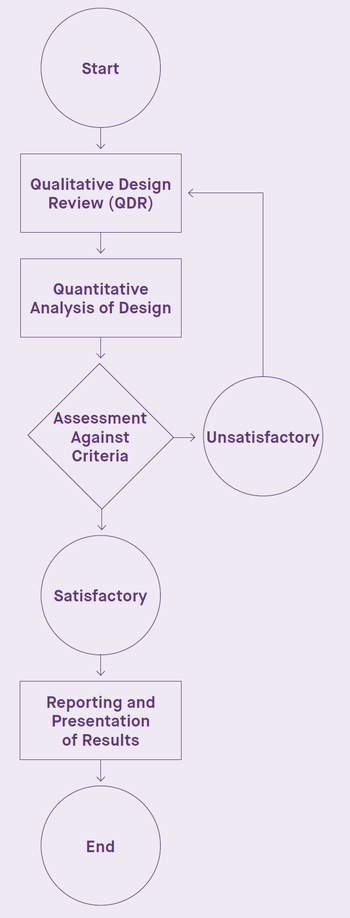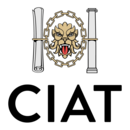Qualitative design review
introduction
A Qualitative Design Review (QDR) is a technique outlined in BS 7974-0 that allows the team to think of the possible ways in which a fire hazard might arise and establish a range of strategies to maintain the risk at an acceptable level.
When designers are engaged in complex designs, regardless of size, they may find it challenging to meet the obligations of Regulations relating to Fire Safety and allowing for fire fighting provisions. BS7974 advocates the use of QDR as a method to engage stakeholders in communication to mitigate risk.
The BS-9999 [1] t [2] fire can be challenged with other fire test data from studies relevant to the application / Trial Design under consideration.
Establishing objectives leads to discussions of life safety solutions beyond those ‘deemed to satisfy’ life safety solutions into meaningful dialogue for assets, business criticality and management decisions for resourcing and training.
Through QDR, a wide range of stakeholders understand the interdependencies between design and operations, and where emphasis on safety is needed, with a broad input from a holistic range of knowledge, engagement is critical to use the resources available effectively.
The whole building life cycle (e.g. change control, product substitution, emerging information and handover) can all be appropriately interrogated through the QDR process to arrive at acceptable solutions to mitigate hazards.
Pessimistic collaboration
The QDR team should take account of the possibility of failures of protection systems and management procedures when establishing the sequences of events to be considered. In a deterministic or comparative study, it is usual to identify a number of worst-case scenarios for further evaluation.
BS-7974-0
A whole fire event can be modelled, with different fire locations, different protection solutions, different management responses, and may include firefighting operations.
Successful QDRs are workshops, not presentations; they are delivered by team effort, not by adversarial argument; they are constructive, not divisive; they are continual, not disjointed; they are visible, not obscurantist.
QDR provides a useful benchmarking exercise against code, regulations and other requirements and recommendations.
The QDR process is flexible and can be used from feasibility right through detail design, construction safety, operations, maintenance considerations and change of use/end of use and handover.

|
| A whole fire event can be modelled, with different fire locations, different protection solutions, different management responses, and may include firefighting operations. |
This article originally appeared as ‘Building a safer future’, in Issue 128 of Architectural Technology Journal, published by The Chartered Institute of Architectural Technologists (CIAT) in Winter 2018-19. It was written by Dr Graham Smith MCIAT.
References:
- [1] Application of fire safety engineering principles to the design of buildings. Code of practice.
- [2] Fire safety in the design, management and use of buildings. Code of practice.
--CIAT
Related articles on Designing Buildings Wiki
Featured articles and news
Statement from the Interim Chief Construction Advisor
Thouria Istephan; Architect and inquiry panel member outlines ongoing work, priorities and next steps.
The 2025 draft NPPF in brief with indicative responses
Local verses National and suitable verses sustainable: Consultation open for just over one week.
Increased vigilance on VAT Domestic Reverse Charge
HMRC bearing down with increasing force on construction consultant says.
Call for greater recognition of professional standards
Chartered bodies representing more than 1.5 million individuals have written to the UK Government.
Cutting carbon, cost and risk in estate management
Lessons from Cardiff Met’s “Halve the Half” initiative.
Inspiring the next generation to fulfil an electrified future
Technical Manager at ECA on the importance of engagement between industry and education.
Repairing historic stone and slate roofs
The need for a code of practice and technical advice note.
Environmental compliance; a checklist for 2026
Legislative changes, policy shifts, phased rollouts, and compliance updates to be aware of.
UKCW London to tackle sector’s most pressing issues
AI and skills development, ecology and the environment, policy and planning and more.
Managing building safety risks
Across an existing residential portfolio; a client's perspective.
ECA support for Gate Safe’s Safe School Gates Campaign.
Core construction skills explained
Preparing for a career in construction.
Retrofitting for resilience with the Leicester Resilience Hub
Community-serving facilities, enhanced as support and essential services for climate-related disruptions.
Some of the articles relating to water, here to browse. Any missing?
Recognisable Gothic characters, designed to dramatically spout water away from buildings.
A case study and a warning to would-be developers
Creating four dwellings... after half a century of doing this job, why, oh why, is it so difficult?
Reform of the fire engineering profession
Fire Engineers Advisory Panel: Authoritative Statement, reactions and next steps.
Restoration and renewal of the Palace of Westminster
A complex project of cultural significance from full decant to EMI, opportunities and a potential a way forward.
Apprenticeships and the responsibility we share
Perspectives from the CIOB President as National Apprentice Week comes to a close.

























